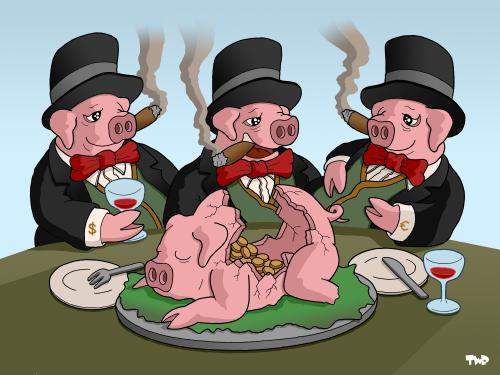 |
| Bank of England |
A cartel is a formal (explicit) agreement among competing firms. It is a formal organization of producers and manufacturers that agree to fix prices, marketing, and production. Cartels usually occur in an oligopolistic industry, where there is a small number of sellers and usually involve homogeneous products. Cartel members may agree on such matters as price fixing, total industry output, market shares, allocation of customers, allocation of territories, bid rigging, establishment of common sales agencies, and the division of profits or combination of these. The aim of such collusion (also called the cartel agreement) is to increase individual members' profits by reducing competition.
One can distinguish private cartels from public cartels. In the public cartel a government is involved to enforce the cartel agreement, and the government's sovereignty shields such cartels from legal actions. Contrariwise, private cartels are subject to legal liability under the antitrust laws now found in nearly every nation of the world.
Competition laws often forbid private cartels. Identifying and breaking up cartels is an important part of the competition policy in most countries, although proving the existence of a cartel is rarely easy, as firms are usually not so careless as to put agreements to collude on paper.
Several economic studies and legal decisions of antitrust authorities have found that the median price increase achieved by cartels in the last 200 years is around 25%. Private international cartels (those with participants from two or more nations) had an average price increase of 28%, whereas domestic cartels averaged 18%. Fewer than 10% of all cartels in the sample failed to raise market prices.
The term cartel came up for alliances of enterprises roughly around 1880 in Germany. The name was imported into the Anglosphere during the 1930s. Before this, other, less precise terms were common to denominate cartels, for instance: association, combination,combine or pool.In the 1940s the name cartel got an Anti-German bias, being the economic system of the enemy. Cartels were the structure the American Anti-Trust-campaign struggled to ban globally.
wikipedia


En economía se denomina cartel o cártel a un acuerdo formal entre empresas del mismo sector, cuyo fin es reducir o eliminar la competencia en un determinadomercado. Los cárteles suelen estar encaminados a desarrollar un control sobre laproducción y la distribución de tal manera que mediante la colusión de las empresas que lo forman éstas forman una estructura de mercado monopolística, obteniendo unpoder sobre el mercado en el cual obtienen los mayores beneficios posibles en perjuicio de los consumidores. Por ello, las consecuencias para éstos son las mismas que con un monopolista. La diferencia radica en que los beneficios totales (que los máximos posibles de conseguir en el mercado) son repartidos entre los productores. Sus principales actividades se centran en fijar los precios, limitar la oferta disponible, dividir el mercado y compartir los beneficios. En la actualidad, el término se suele aplicar a los acuerdos que regulan la competencia en el comercio internacional.
Los defensores de los cárteles afirman que éstos ayudan a estabilizar los mercados, a reducir los costes de producción, a eliminar aranceles elevados, a distribuir losbeneficios equitativamente y a beneficiar a los consumidores. Sus detractores señalan que, cuando no existe competencia, los precios son mayores y la oferta menor. Hoy en día se considera que sus inconvenientes son mayores que sus ventajas y a menudo se establecen límites legales para restringir el desarrollo de nuevos cárteles.
Actualmente se encuentran prohibidos y sancionados por ley la formación de cárteles entre varias empresas del mismo sector en la mayoría de países.

Δεν υπάρχουν σχόλια:
Δημοσίευση σχολίου